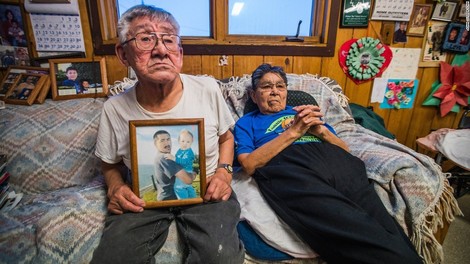Your podcast discovery platform
Curious minds select the most fascinating podcasts from around the world. Discover hand-piqd audio recommendations on your favorite topics.

piqer for: Climate and Environment Global finds Globalization and politics
I'm a freelance journalist, currently based in Madrid. I used to be a News Producer at CNBC in London before, but I thought a little bit more sun might do me good. Now I write for several news organizations, covering a range of topics, from Spanish politics and human rights for Deutsche Welle to climate change for La Marea.
Alaskan Villages At The Front Line Of Climate Consider Relocation As A Last-Minute Solution
I've had this story bookmarked for almost a month now. I had watched the video at the top, and its images had caught my imagination. This, I thought, is what we need to portray the impact of climate change on human communities. Today, I got around to reading the whole thing, and I was not disappointed. Welcome to Shishmaref, the waning village at the end of the Earth that won't be there anymore when our generation gets old.
The Arctic is melting rapidly, and by 2040 we may have no sea ice left. This affects us all. It doesn't matter where you live. But for them, it means an existential threat in a matter of decades, if not years: Temperature rises twice as fast as elsewhere, and the lack of ice means rising seas, increases the chances of coastal erosion and the thawing of permafrost methane bombs.
Explaining all this is hard, until you get to Shishmaref. Through a blue house at the edge of a beach, it all becomes clear. The author drives us through the lives of the inhabitants of this tiny Alaskan village to makes us understand how real and serious climate change really is. It's a real change to people's lives, and what now happens in Shishmaref could tomorrow take place in New York, Shanghai, Dhaka or London.
The video is good, but the text is better, and they are both thankfully accompanied by really illustrating infographics. I was shaken by the one that shows how much coastal erosion the island suffers, and how the coastline is advancing. Simple and effective
I do have one small criticism. I didn't quite like the mix of science and mythological beliefs. I understand the lyricism of Northern traditions, and how those can help write a more appealing message, but they could confuse or alienate readers who don't quite know the facts of climate science.
All in all, a very good read, together with a nice video if you don't have the time to go over the whole story. Excellent photos and explanatory infographics. And human stories to go with it. Well done.

great piq, santi, thx a lot! has the "change" in your piq's title already been erroded by the raising sea level? "at the front line of climate" is something we all face, daily. sorry for being nitpicking but i already heard about 'climate deniers' from one journalist, argh. sometimes shorter isn't necessarily better...